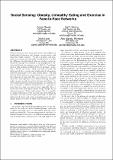Social sensing: Obesity, unhealthy eating and exercise in face-to-face networks
Author(s)
Madan, Anmol Prem Prakash; Moturu, Sai T.; Lazer, David; Pentland, Alex Paul
DownloadPentland_Social Sensing Obesity.pdf (530.7Kb)
OPEN_ACCESS_POLICY
Open Access Policy
Creative Commons Attribution-Noncommercial-Share Alike
Terms of use
Metadata
Show full item recordAbstract
What is the role of face-to-face interactions in the diffusion of health-related behaviors- diet choices, exercise habits, and long-term weight changes? We use co-location and communication sensors in mass-market mobile phones to model the diffusion of health-related behaviors via face-to-face interactions amongst the residents of an undergraduate residence hall during the academic year of 2008--09. The dataset used in this analysis includes bluetooth proximity scans, 802.11 WLAN AP scans, calling and SMS networks and self-reported diet, exercise and weight-related information collected periodically over a nine month period. We find that the health behaviors of participants are correlated with the behaviors of peers that they are exposed to over long durations. Such exposure can be estimated using automatically captured social interactions between individuals. To better understand this adoption mechanism, we contrast the role of exposure to different sub-behaviors, i.e., exposure to peers that are obese, are inactive, have unhealthy dietary habits and those that display similar weight changes in the observation period. These results suggest that it is possible to design self-feedback tools and real-time interventions in the future. In stark contrast to previous work, we find that self-reported friends and social acquaintances do not show similar predictive ability for these social health behaviors.
Date issued
2010-10Department
Massachusetts Institute of Technology. Engineering Systems Division; Massachusetts Institute of Technology. Media Laboratory; Program in Media Arts and Sciences (Massachusetts Institute of Technology)Journal
Wireless Health '10
Publisher
Association for Computing Machinery
Citation
Madan, Anmol et al. “Social Sensing.” Wireless Health 2010 on - WH ’10. San Diego, California, 2010. 104.
Version: Author's final manuscript
ISSN
978-1-60558-989-3